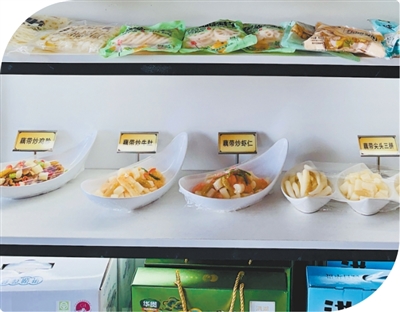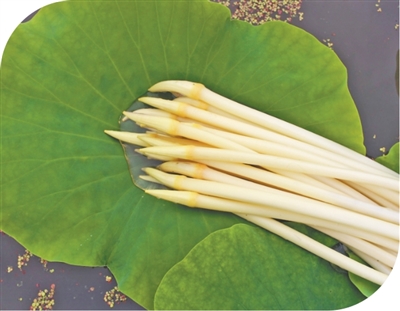




- BRNN
- BRI News
- BRNN News
- Database
Official Documents Polices and Regulations
Inter-government Documents International Cooperation BRI Countries
Business Guide Economic Data BRI Data
Trade
Investment Projects Latest projects
Cases - Content Pool

Photo shows lotus rootlet products developed in Honghu city, a county-level city administered by Jingzhou, central China's Hubei Province. (Photo/Wu Jun)
In the early morning, farmer Zhou Jincai is already wading through a sea of lotus leaves to pick lotus rootlets in Pingyang village, Huangjiakou town, Honghu city, a county-level city administered by Jingzhou, central China's Hubei Province. During the April-September harvest season, Zhou picks more than 50 kilograms of lotus rootlets daily, earning a daily net income of more than 400 yuan (about $ 55.71).
Honghu lotus rootlets have been recognized as a national geographic indication product. For years, however, their reach was limited by short shelf life and lack of sales channels. Now, they've made their way to dinner tables across the country.
At the smart workshop of Hubei Huagui Food Co., Ltd. in Honghu, lotus rootlets are cut, cleaned, and blanched before rolling off the automated production line as packaged products.
"We now purchase 50,000 kilograms of fresh lotus rootlets every day, most of which we process into pickled products," said Yang Fuyuan, general manager of the company. Yang added that lotus rootlet products generate over 1.4 billion yuan in annual output value.
Despite their excellent quality and flavor, Honghu's lotus rootlets didn't fetch a good price due to lack of branding.

Photo shows freshly harvested lotus rootlets in Honghu city, a county-level city administered by Jingzhou, central China's Hubei Province. (Photo/Li Youhua)
In 2012, after extensive market research, the company decided to make lotus rootlets its core product. To extend the shelf life of lotus rootlet products, the company teamed up with Huazhong Agricultural University to develop a directional fermentation technology. By sealing the lotus rootlets in light-proof bags and fermenting them, their shelf life was extended from just one or two days to nearly a year. Now, lotus rootlets harvested in spring can be sold year-round.
The company established a nationwide network of over 2,000 distributors and tapped into e-commerce, driving annual online sales past 100 million yuan and selling more than 80 million bags of lotus rootlets each year.
The company developed a complete lotus product supply chain, developing products like lotus soup and wild lotus juice.
"We process different products throughout the year—shoots in spring, tea in summer, seeds in autumn, roots in winter," Yang explained.
Today, the company operates six deep-processing lines capable of producing over 30 different lotus-based products, with an annual processing capacity of more than 180,000 tonnes. According to Yang, the business supports more than 30,000 farming households and manages over 100,000 mu (about 6,666.67 hectares) of lotus plantations.
Honghu's lotus rootlets are now widely available in supermarkets and online platforms, making their way onto dinner tables across China.
However, lotus farming wasn't always a profitable venture. In lean years, many farmers abandoned their ponds to raise fish or shrimp instead, causing raw material shortages. "There was no price stability," recalled Hong Xiaojun, head of a lotus planting cooperative.
To bring order and unity, local cooperatives and leading enterprises began working directly with farmers.
"For those no longer interested in growing lotus, we lease their fields and pay them rent," said Hong. "When it's harvest time, we hire farmers to dig up the roots and pay them for their labor." During peak season, farmers can earn up to 8,000 yuan a month this way, said Hong.
To ensure consistent quality, the local government now oversees the development and supply of lotus seed varieties.
"We're also pushing for large-scale and standardized production," said Zhang Xianzhong, head of the Honghu Lotus Root Industry Development Center.
In 2024, a lotus supply chain platform was launched in Honghu. So far, the platform has attracted over 120 members and facilitated more than 300 million yuan in transactions.
Today, Honghu has over 250,000 mu under lotus cultivation, with a total output value of 6.5 billion yuan. Its lotus seeds, lotus rootlets, roots, and lotus leaf tea have been certified as national geographic indication products, said Zhang.
Initially, lax oversight of regional branding allowed some companies to register "Honghu Lotus" as a private trademark, creating confusion—local farmers and cooperatives couldn't sell their own produce under the Honghu name. That changed in 2018, when "Honghu Lotus" was recognized as a national geographical indication trademark for regional public use. Now, any qualified local producer can apply to use the brand free of charge.
Today, Honghu is home to 35 lotus processing and related companies producing 56 types of products. Over 600 e-commerce operators in the lotus sector have registered, with the industry generating 350,000 tonnes of products annually and a total annual output value of 9 billion yuan.

Tel:86-10-65363107, 86-10-65368220, 86-10-65363106